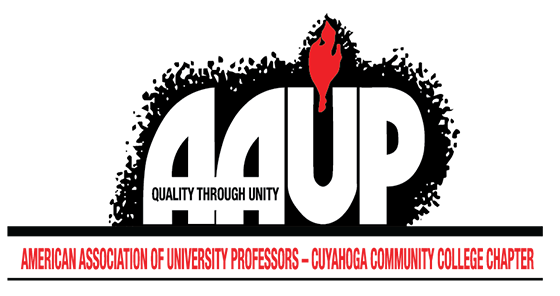Tenure Information
2023 Tenure Workshop (starts at 28:30):
2022 Tenure Workshop:
PowerPoint Slides – Tenure Track Workshop
Tenure is not an automatic process.
According to Article 37 of the 2022-2025 CCC-AAUP Contract, tenure is the award of continuous employment. The Board of Trustees awards tenure on the basis of faculty competence. Since faculty competence can be general and vague, the CCC chapter of the AAUP has provided tips and information to illustrate the expertise of the profession. Tenure can be a very stressful process, but preparing well and getting used to the idea of telling people what good things you are doing can make it easier. Asking questions and keeping informed are great tools as well.
Tenure is recognition of faculty competence. It is the College’s most effective means for establishing a climate of academic freedom and professional responsibility. Tenure is a way of CCC’s supporting academic freedom and the professional responsibility of the individual to whom tenure is awarded.
When do I apply for tenure?
Tenure-track instructional faculty, counselors, and librarians are eligible for tenure. All tenure-track faculty shall become eligible for tenure after five (5) years of service to the College during which they have served over 50% of their annual contractual time in a teaching capacity. Teaching capacity is defined by the College as: classroom instruction, college librarian or counseling. For example, if one was hired and started at the beginning of Fall 2005, they would submit the materials necessary to apply for tenure at the end of Fall 2009. If the applicant meets the criteria of demonstrated teaching ability, creative achievement, academic integrity and professional service to the College and to the community, then the award of tenure is granted with their next faculty contract Fall 2010.
How do I apply for tenure?
Customarily, the eligible faculty member will submit a portfolio that summarizes their service for the past five years. The college looks at demonstrated teaching ability, creative achievement, academic integrity and professional service to the College. Every year the CCC-AAUP hosts a workshop at each campus and discusses tenure at length with those in the track. Examples of recent tenure portfolios are usually brought for reference.
Tenure Portfolio Guidance for Faculty (Updated Fall 2015)
What happens if I’m not awarded tenure?
If an eligible faculty member does not receive tenure after applying, then the college provides a written statement which includes the reason for the rejection in tenure. An appeal can be made to the decision with the help of the CCC-AAUP. Some decisions in the past have been reversed after appeal. The College President and one or two CCC Trustees serve on the appeal panel. If an appeal is denied, the faculty member will receive in most cases a one-year terminal contract.
More information on tenure
- http://www.aaup.org/issues/tenure/resources-tenureThe American Association of University Professors provides some excellent resources on tenure and its importance in the academic community.
- http://www.econlib.org/library/Columns/Mirontenure.htmlThis link contains an interesting article by Jeffrey Miron about the economics of tenure.Although informative, the following links should not be used at CCC in guiding your tenure track activities:
- http://www.nea.org/home/35340.htmThe National Education Organization presents some information on tenure from the NEA’s refereed journal in higher education.
- http://www.aft.org/issues/highered/truthtenure.cfmThe American Federation of Teachers discusses myths and realities about tenure in higher education.
Professional Improvement Leave (PIL) Information
2024 Professional Improvement Leave (PIL) Workshop:
2023 Professional Improvement Leave (PIL) Workshop:
PIL Instructions – Completing Form A
ARTICLE 11 – PROFESSIONAL IMPROVEMENT LEAVE
A. Professional Improvement Leaves will be made available to members of the bargaining unit to promote instructional excellence and professional development. Such leaves may be made available by the College’s Board of Trustees each academic year for the purpose of additional education, research, or other such activities deemed of value to the educational mission of the College. At the discretion of the College, any or all of the professional improvement leaves may be designated to be used by individuals to prepare themselves in an additional field of teaching expertise, or for any other appropriate purpose.
B. Members of the bargaining unit who have been contracted by the College as full-time faculty members for a minimum of seven (7) academic years of teaching service are eligible to apply for a professional improvement leave. For the purposes of this policy, “academic years of teaching service” shall mean any nine-month period during which a full-time faculty member is under contract with the College.
C. The number of professional improvement leaves granted by the College each academic year will be limited to five percent (5%) of the total number of full-time faculty members; however, the number of leaves available for each campus will be proportional to the total number of such bargaining unit members eligible for consideration for professional improvement leaves at each campus.
D. The College will provide professional improvement leaves to a maximum of five percent (5%) of the full-time, tenure-track faculty as follows:
- Plan A – 2 semester absence at 50% annual salary.
- Plan B – 1 semester absence at 75% annual salary.
- Plan C – 2 semester absence at 100% annual salary (available to full-time faculty members after 14 years of teaching service with the College provided any such faculty member has not taken a professional improvement leave in the previous 14 years. Plan C shall be limited to eligible faculty up to 50% of the 5% maximum set forth in this article.

 Union Office
5415 Schaaf Road
Independence, Ohio 44131
216-524-7440
Union Office
5415 Schaaf Road
Independence, Ohio 44131
216-524-7440